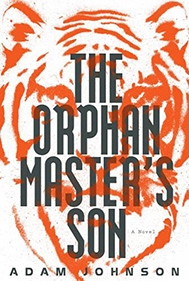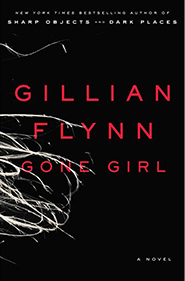by David Abrams
Buy on NOOK »-
March 28, 2013
Zombie Round
-
Adam Johnson
Z2The Orphan Master’s Son
v.
1Gone GirlGillian Flynn
-
Judged by
Lev Grossman
Oddly enough—and as far as I can tell this is totally by chance—the two books in this round are about exactly the same thing: the malevolent power that stories have to distort reality and erase the personal truth of a human life. Perversely and recursively, these are two stories about how evil stories can be. Anyone who, in our hyper-mediated, non-linear, low-attention span screen culture, doubts the power of mere narrative told in mere words should read both of them. Here’s how a story can turn an innocent man into a monster. Boom. Here’s how a story can subjugate a nation of millions. Boom.
And said hypothetical reader should also read them because they’re both really great. Boom.
This is the Zombie Round, and The Orphan Master’s Son is the Zombie—it lost an earlier matchup with Chris Ware’s Building Stories. But it has risen from the dead to once again stalk the earth and lo, it is a freaking monster. I loved it. The two weeks I spent reading it went by in a haze of pleasure and sorrow and awe and neglect-of-my-children.
The Orphan Master’s Son is about something that before I read it I was not particularly interested in: life in the little bubble of earthly hell called North Korea. I got interested pretty fast. Our hero is a man named Pak Jun Do who grew up in an orphanage (he’s the son of the orphan-master, though he’s often mistaken for an orphan himself). As the book scrolls forward he ricochets maniacally from place to place to place, as the state remakes Jun Do’s identity again and again on the fly according to its antic whims—generically the book is a picaresque, with Jun Do as Candide and Kim Jong-il as his monstrous, all-powerful Pangloss. First he’s a soldier specializing in tunnel combat, then a kidnapper of Japanese civilians (for use as language teachers, and playthings of the Pyongyang plutocracy), then a spy stationed on a fishing boat, then a hero of the people, then an inmate at a forced labor camp, before he lands, finally and bizarrely, at the precarious pinnacle of North Korean society.
The whole thing has a hallucinatory, fever-dream quality: Reality in North Korea is fluid, melted like a chocolate bar in the sweaty grip of the Dear Leader. Whatever he says is real, becomes real. When your spouse dies or commits a crime, he or she is simply replaced by another person who is assigned your old spouse’s identity. No one, no matter how comfortable, is ever further than a coin toss away from imprisonment and forced labor and starvation and torture. “Where we are from, stories are factual,” a veteran government functionary tells Jun Do. “If a farmer is declared a music virtuoso by the state, everyone had better start calling him maestro. And secretly, he’d be wise to start practicing the piano. For us, the story is more important than the person. If a man and his story are in conflict, it is the man who must change.”
Jun Do spends the book trying to stay alive, but in a world where one’s identity, one’s self itself, is a plaything of the state, hardly anyone ever feels fully alive—real life happens only in stolen seconds, in the precious gaps in surveillance, when the eye of Sauron blinks and privacy is momentarily possible. On a diplomatic trip to Texas, a woman mishears Jun Do’s name: “John Doe? Isn’t that the name you give a missing person?” Exactly.
Books that deal with the nightmare of poverty and oppression sometimes take it too far—they sometimes rub the reader’s nose in it, depicting ugliness and oppression by being ugly and oppressive themselves. But this is not that. Johnson, with an ingenuity and elegance and imaginative power that beggar description, makes poetry out of the coarse, threadbare material of Jun Do’s daily life. One night during his term in a brutal labor camp, an older inmate whispers to Jun Do that one of the searchlights has burnt out. Together they sprint for the darkened corner of the compound. For a second you think they’re trying to escape, until you realize they’re just making a desperate bid for some extra protein: “In the dark, they crouched, picking up all the moths that had fallen dead before the lamp had died.”
Johnson is equally good when he reverses the polarity and writes in the surreally upbeat voice of a state broadcaster. Here he is making a virtue of the fact that the power goes out every night in North Korea:
No nation sleeps as North Korea sleeps…The American citizen, however, is wide awake. You should see a satellite photo of that confused nation at night—it’s one grand swath of light, glaring with the sum of their idle, indolent evenings. Lazy and unmotivated, Americans stay up late, engaging in television, homosexuality, and even religion, anything to fill their selfish appetites.
As I read this book I was repeatedly confronted by passages like this, moments that not only stunned me as a reader by their beauty and sadness and horror and intelligence, but also as a writer of fiction to the point where I kept asking myself, how the hell is he doing this? (As a good critic, I kept records of these moments. There were 23 of them.) The Orphan Master’s Son reminded me of The Painted Bird and Brazil and most of all 1984. Like that novel, it’s a thought experiment about how much they can take away from you, and what, if anything, is left after they take it. Also like 1984, it’s a fucking masterpiece.
There’s a bit of asymmetry built into this round, because while I was reading The Orphan Master’s Son for the first time, I was re-reading Gone Girl. And not only had I already read Gone Girl, I already reviewed it when it first came out. It makes a difference: With The Orphan Master’s Son I’m in the first flush of infatuation, but with Gone Girl, we’ve lived together for a while. The honeymoon is over. We know each other better, but we’ve had a chance to get on each other’s nerves, too. I love you, don’t forget to take out the trash.
(By the way, you can’t talk about Gone Girl seriously without massive spoilers, so if you haven’t read it, do yourself a favor and skip the next like nine paragraphs or so.)
When I first read Gone Girl I was very much infatuated with it. I was intoxicated by its cleverness, and its nastiness, and its clinical anatomization of all the various ways in which our personalities are fabrications, and all the various reasons, good and bad and really bad, why we fabricate them. The hero, Nick Dunne, is a New York City magazine writer turned Missouri bar owner, a small-town golden boy whose gold leaf has mostly flaked off. Nick is a compulsive people-pleaser. “You’d literally lie, cheat and steal—hell, kill—to convince people you are a good guy,” his twin sister tells him.
It’s true. He doesn’t actually kill anybody, but when Nick is accused of a crime, he can’t stop lying to the police and the media and his family about it, even though he’s totally innocent. Well, not totally innocent. But he definitely didn’t kill his wife.
His wife was and is Amy, a massively ambitious type-triple-A Harvard grad with a nuclear furnace for a brain. Trapped in North Carthage, Missouri with no prospects to speak of, her contempt for her husband doubling every week like a backgammon cube, Amy’s brain starts to melt down. Eventually, on their fifth anniversary, she snaps and—as one does—stages her own disappearance and frames Nick for it, to the point where she even fabricates a secret diary in which she presents herself as a desperate ingénue held hostage by his increasingly scary behavior. The book becomes an elaborate storytelling contest: Nick and Amy each create narratives about the other and themselves, and whoever can convince the police and the media—and him- or herself—that their story is the true story wins.
Gone Girl proceeds in a series of sudden shuddering unexpected downward lurches as the two main characters, in alternating chapters, repeatedly shock the audience with their willingness to behave worse and worse, and the ingenuity with which they do it. Amy’s voice practically vibrates on the page with righteous anger. She’s a psycho liar, but she’s also a truth-teller, cutting through the greasy scum of everyday bullshit like industrial detergent. Here she is piling contempt onto the “Cool Girl” persona that men love so much:
Being the Cool Girl means I am a hot, brilliant, funny woman who adores football, poker, dirty jokes, and burping, who plays video games, drinks cheap beer, loves threesomes and anal sex, and jams hot dogs and hamburgers into her mouth like she’s hosting the world’s biggest culinary gang bang while somehow maintaining a size 2, because Cool Girls are above all hot. Hot and understanding. Cool Girls never get angry; they only smile in a chagrined, loving manner and let their men do whatever they want Go ahead, shit on me, I don’t mind, I’m the Cool Girl.
Yeah. These are things that need to be said.
And yet.
Despite its many moments of brilliance, Gone Girl had very slightly curdled when I came back to it after six months. The two principals are, ultimately, not all that pleasant, either of them. You can see why they hate each other—they’re very convincing with it, their mutual hate, and over time I started to share it. Amy thinks Nick is pathetic, Nick thinks Amy is psychotic, and on some level they’re both kind of right.
I also lost a little of my faith in Gone Girl as an authentic portrait of a marriage. It’s a wildly clever artifact, and God knows there’s a sick thrill in looking into a marriage that nasty—it’s like one of those clear plastic boxes where they’ve persuaded wasps to nest, so you can see them crawling around inside. But to me the book began to feel like it was driven more by the need to deliver sick thrills than by the need to paint a true picture of real life as real people actually live it. Which nothing against sick thrills. But over time the thrill faded, and only the sick feeling remained.
This isn’t to say that Gone Girl is a bad book. I absolutely loved it when I read it, and that love was real. It just didn’t last. Gone Girl turned out to be only human. Whereas The Orphan Master’s Son is a freaking Zombie, and the love of the undead is forever.
Match Commentary
By Kevin Guilfoile & John Warner
John: This is a purely unscientific impression, but I feel as though we’re at an all-time high of judge enthusiasm toward the books in the Tournament this year.
We always seem to have some matchups that rest on a winner being the lesser of two “meh,” but I can’t recall a single day this year where the judge wasn’t enthused by at least one of the competing titles, and more often than not we’ve been treated to some serious, and seriously enjoyable, handwringing.
Lev Grossman is an interesting case, having feet firmly planted as both a critic and an author. I tend to read books through a “how’d he/she do that?” lens, often experiencing less concern about what a book is saying. Grossman does both, picking up on some connections with The Orphan Master’s Son I wouldn’t have noticed (1984, The Painted Bird), but strike me as almost obvious in hindsight.
We also have an interesting first read versus re-read phenomenon going on here. We’ve commented often about how well Gone Girl seems to hold up to additional scrutiny, something not always true of thrillers with such propulsive plots, but Grossman sees some flaws brought forth by time. I think these are inevitable with a book like Gone Girl where the spell (“this book hijacks your life”) it puts you under is so intense. It’s like a really intense crush, and as Grossman notes, sometimes crushes can “curdle.”
I recently used my weekend Biblioracle column to talk about this phenomenon vis à-vis The Dinner by Herman Koch. The book got its hooks in me and wouldn’t let go for anything. I’m pretty sure I emailed you that you needed to read it before I was even half done. At the three-quarter mark I hired a skywriter to spell out “Everyone Should Read The Dinner,” but an unfortunate breeze turned that into “Everyone Should ea T Dinner,” which is true enough.
My instant ardor having cooled, I can see all kinds of “flaws” in The Dinner, and if a year from now I am asked to compare it to another really good and interesting book, I could easily see passing it over.
Kevin: You emailed me and I bought The Dinner the next day and read it in two sittings. The Dinner is being described as the Dutch Gone Girl, and while that is obviously a marketing gimmick (complete with a glowing blurb from Gillian) I think it’s true to the extent that many people who enjoyed Gone Girl would also enjoy The Dinner. The converse is also true, of course. Anyone who was put off by Gone Girl because it had “unlikable characters” should give The Dinner a wide berth. The Dinner is for readers who like their nihilism paired with an expensive Gigondas, which I must, because I really enjoyed it.
Judge Grossman says that he “lost a little of my faith in Gone Girl as an authentic portrait of a marriage.” I’ll defend the book on that point. I don’t think it’s spoilery anymore to point out that there are really two Nick/Amy marriages portrayed in the book. The first one was palpable to me. There were moments, and several of them, when I chuckled nervously to myself because I recognized a truth about my own marriage that I had never acknowledged out loud. If there is a higher pleasure to be had while reading than discovering a true thing you’ve never had words for, I’m not sure what it is.
Of course, that marriage turns out to be a fiction inside a fiction—the real Nick-and-Amy marriage turns out to be preposterous (and great fun for the reader to discover). But the first marriage is still based on the observations and insights of Gillian Flynn, and while much of it may be an illusion inside the book, it remains very authentic—at least to me—outside of it.
As for The Orphan Master’s Son, it is a book I have been championing for over a year and I’m pleased to see it in the championship. All four of these final books—Building Stories, The Fault in Our Stars, Gone Girl, and Orphan Master—were comfortably in my top 10 of the year, and if you asked me on the right day they would make up four of my top five.
Johnson’s book was somehow forgotten by a lot of the end of the year lists. The New York Times published its list of 53 notable works of poetry and fiction from last year and The Orphan Master’s Son was nowhere on it. In fact, although that list had 11 of this year’s ToB finalists, it included only one of our final four—Building Stories. (Curiously, it even included one book from last year’s ToB—Jesmyn Ward’s Salvage the Bones.)
John: As of this writing I don’t yet know the results of tomorrow’s contest, and I am historically very very bad at picking the winner in the championship, but this year, I am feeling confident in a victory for The Orphan Master’s Son. The Fault in Our Stars is one of the most popular books ever in the Tournament, but I think our panel is going to tilt toward the story of Jun Do. Sure, it went down to defeat once (as did Fault), but there have been very few disparaging words coming its way in either the judging or reader commentaries. I won’t predict a tally, but I believe the margin will be comfortable.
Kevin: This is the first year in which the two finalists were both Zombie picks. It’s also the third year in a row in which the final contest is a rematch, and if history is any guide, The Orphan Master’s Son might be in for a fight. Last year, Patrick deWitt’s The Sisters Brothers avenged an earlier defeat to Teju Cole’s Open City, 10-6. In 2011, Jenifer Egan’s A Visit From the Goon Squad beat Jonathan Franzen’s Freedom 9-8, after Goon Squad was vanquished in the semifinals by Franzen’s book.
Tomorrow we’ll have the result, and we’ll also announce the winners of TMN’s reader contest, one of whom will win a NOOK HD+ and the other will receive a Barnes & Noble gift card, courtesy of The Morning News.
One more day. So much to be decided.
























